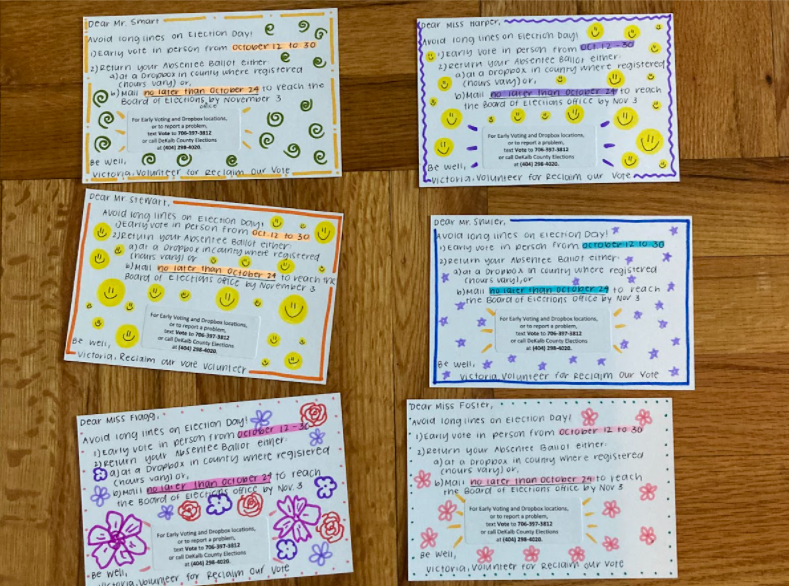Postcards against voter suppression
Students aim to increase voter registration through hand-crafted letters
March 8, 2022
Pretty, aesthetically pleasing postcards seem like an unlikely tool to fight voter suppression, but members of the Postcards For Change club have been making it work for several years now.
The club focuses on mailing potential voters postcards to encourage them to register. It also sometimes takes on smaller side projects, according to junior Bella Daly, the club’s co-president.
“I’d say we’re really dedicated to getting students involved in politics, and just getting more involvement at the local and higher up levels,” Daly said. “I think it’s a great way to be active in your community, and just spread awareness and make changes where we can, especially with the political climate that we’re currently in.”
Voter suppression is defined as creating unnecessary barriers to voting. These measures disproportionately affect people of color, students, and the elderly and disabled, according to the American Civil Liberties Union.
“It’s not just a couple of really bad people who are stopping other people from voting,” co-president and junior Ella Rosenblum said. “It’s, like, governments, and people running polling stations, and these are official situations … That was something that, when I first heard about it, I was like, this is kind of insane. Like why are we not focusing more on this?”
Postcards For Change predominantly writes postcards through Reclaim Our Vote, a non-partisan, non-profit organization that writes to potentially suppressed voters and encourages them to register to vote.
“Our goals are to inform as many people as possible of the best ways for them to be able to vote, because it is unnecessarily difficult in many states, and target certain groups of people,” Rosenblum said. “For everything, people should be registered [to vote] and oftentimes people are removed from the registration list without their knowledge of it.”
Postcards For Change also attempts to promote change at the government level by writing postcards to legislators, according to Rosenblum. Last year, they partnered with the Flow Club, a club promoting access to menstrual products.
“We wrote to representatives who tried to extend a law that we had in California that was to not have a luxury tax on menstrual products,” Rosenblum said.
Daly said it was nice to see her postcards make a tangible change in voter registration in a region she wrote to.
“When you could see voter turnout in a specific area you wrote to increase, then you have a little feeling of, like, oh wow, I actually made a difference,” Daly said.
Rosenblum said she believes that young people shouldn’t wait until they’re adults to advocate for their beliefs, and that this will build a habit of voting and being engaged later on.
“Even without voter suppression, there’s kind of low voter turnout with young people, and it’s really important to start getting really engaged in this stuff at an early age,” Rosenblum said. “It builds a habit for you, always being engaged in what’s going on in your country from a young age, and we need young people to vote.”

